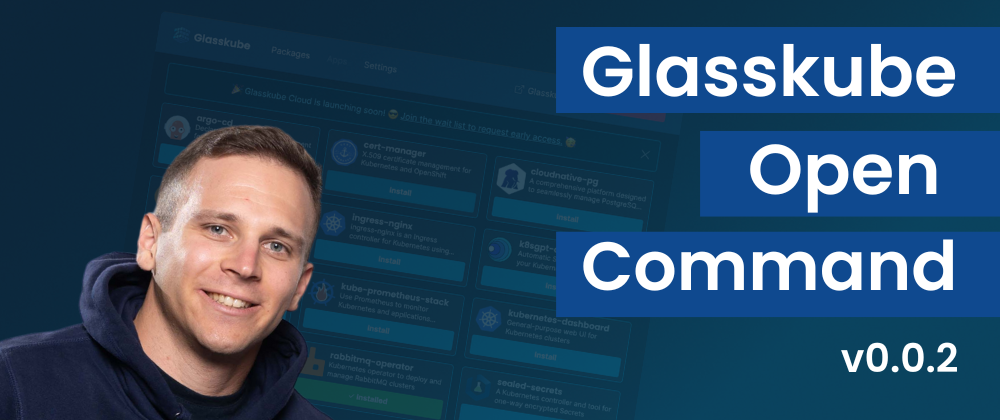Glasskube v0.0.2 — Open Command

Glasskube v0.0.2 was released on February 9th, just 9 days after initial technical preview release.
Glasskube is fully open-source. Support us by leaving a star: ⭐ glasskube/glasskube ⭐
🙏 Special thanks to all our contributors 🥰
We didn't anticipate rolling out our second preview release just one week after the initial one, but thanks to the remarkable contributions from our community, that's exactly what we've done.
This release includes:
- 👥 a total of 14 (mostly new) contributors
- 🛠️ 58 commits
- 💥 no breaking changes
Watch our release video to get an overview of what has changed:
Most notable changes
Of all changes, bugfixes and improvements, two new features stand out in the second release:
The open command
Introducing Glasskube's newest feature: the open command!
Gone are the days of laboriously setting up multiple TCP tunnels with kubectl port-forward just to access specific services.
With Glasskube, accessing your desired services is now as easy as a click or a simple command.
Say goodbye to unnecessary complexity and hello to effortless convenience.
Realtime updates with htmx
The second-biggest achievement of this release: The integration of htmx for real-time updates. This advanced feature enables automatic and instantaneous updates to your graphical user interface, eliminating the need for manual page refreshes. With htmx, your application stays dynamically synchronized with backend changes, ensuring a seamless and responsive user experience.
BREAKING changes
This release does not contain any breaking changes.
All Release Notes
The release notes can be found here: v0.0.2 release on GitHub
All changes can be found here: Comparing v0.0.1 to v0.0.2
How to upgrade
Follow the installation instructions below to download the latest version of the Glasskube client. After that you need to upgrade the server component (Package Operator) by bootstrapping Glasskube again:
glasskube bootstrap
Getting started
Follow our Getting Started guide if you want to try Glasskube for yourself and install your first package.
- macOS
- Linux
- Windows
- NixOS/Nixpkgs
On macOS, you can use Homebrew to install and update Glasskube.
brew install glasskube/tap/glasskube
You can install Glasskube using one of the package managers below.RPM-based installation (RedHat/CentOS/Fedora)
dnf install https://releases.dl.glasskube.dev/glasskube_v0.26.1_amd64.rpmDEB-based installation (Ubuntu/Debian)
curl -LO https://releases.dl.glasskube.dev/glasskube_v0.26.1_amd64.deb
sudo dpkg -i glasskube_v0.26.1_amd64.debAPK-based installation (Alpine)
curl -LO https://releases.dl.glasskube.dev/glasskube_v0.26.1_amd64.apk
apk add --allow-untrusted glasskube_v0.26.1_amd64.apk
If you are using a distribution that does not use one of the package managers above, or require a 32-bit binary, check out additional download options attached to our latest release.
Download the windows archive from our latest Release and unpack it using Windows Explorer.
You can either use the package temporarily in a nix-shell:
nix-shell -p glasskube
Or install it globally by adding pkgs.glasskube to your environment.systemPackages.
After installing Glasskube on your local machine, make sure to install the necessary components in your Kubernetes cluster by running glasskube bootstrap.
For more information, check out our bootstrap guide.
Get involved
The easiest way to get involved is to tackle one of our open issues. You are also welcome to join our Discord.
If you are a cloud native developer, please submit your package.
As Glasskube is still in its very early days, your feedback is highly appreciated. Let us know what you think, we would love to hear from you or support us by leaving a star on GitHub: